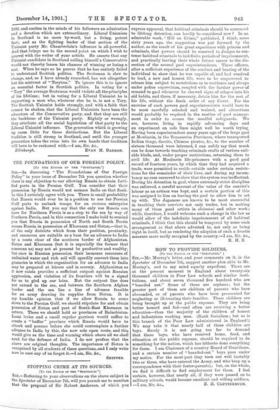STOPPING CRIME AT ITS SOURCES.
[To THE EDITOR OF THE "SPECTATOR."] SIR,—Referring to your observations on the above subject in the Spectator of December 7th, will you permit me to mention that - the 'proposal of Sir Robert Anderson, of which you express approval, that habitual criminals should be sentenced to lifelong detention, can hardly be considered new P In an admirable work, "Hill on Crime," published, I think, some sixty years ago, the suggestion was put forward by the author, as the result of his great experience with prisons and criminals, that powers should be reserved to Judges to sen- tence habitual criminals to indefinite periods of imprisonment, and practically leaving their whole future career to the dis- cretion of the several gaol superintendents. These officers, after a sufficient experience of the conduct and bearing of the individual to show that he was capable of, and had resolved to lead, a new and honest life, were to be empowered to release him subject to restrictions as to residence and always under police supervision, coupled with the further power of remand to gaol whenever he showed signs of relapse into his old habits, and there, if necessary, detain him for the rest of his life, without the fresh order of any Court. For the exercise of such powers gaol superintendents would have to be most carefully selected and trained, and alterations would probably be required in the routine of gaol manage- ment in order to secure the needful safeguards. We are, however, living in rapidly advancing days and an experiment on safe lines might well be worth trying. Having been superintendent many years ago of the large gaol at Moulmein, in the Tenasserim Provinces, where transported Indian thugs, dacoits, Chinese pirates, &c., to the number of sixteen thousand were interned, I can safely say that much can be done towards teaching criminals crafts of various suit- able kinds, and, under proper restrictions, returning them to civil life. At Moulmein life-prisoners with a good gaol record of fourteen years, by which time they had acquired a trade, were permitted to reside outside under certain restric- tions for the remainder of their lives, and during my incum- bency no case occurred to show that the system was ineffectual. During his detention in gaol, where extremely strict discipline was enforced, a careful account of the value of the convict's labour as an artisan was kept, and a certain portion of this was assigned to him on leaving the gaol to allow him to set up with. The Japanese are known to be most successful in teaching their convicts not, only trades, but in making many of them good artists in cloisonn4 and other work ; while, therefore, I would welcome such a change in the law as would allow of the indefinite imprisonment of all habitual criminals, I think that this should be tempered by some such arrangement as that above adverted to, not only as being right in itself, but as rendering the adoption of such a drastic measure more easily accepted by the country.—I am, Sir, Sze.,
R. H. S.














































 Previous page
Previous page